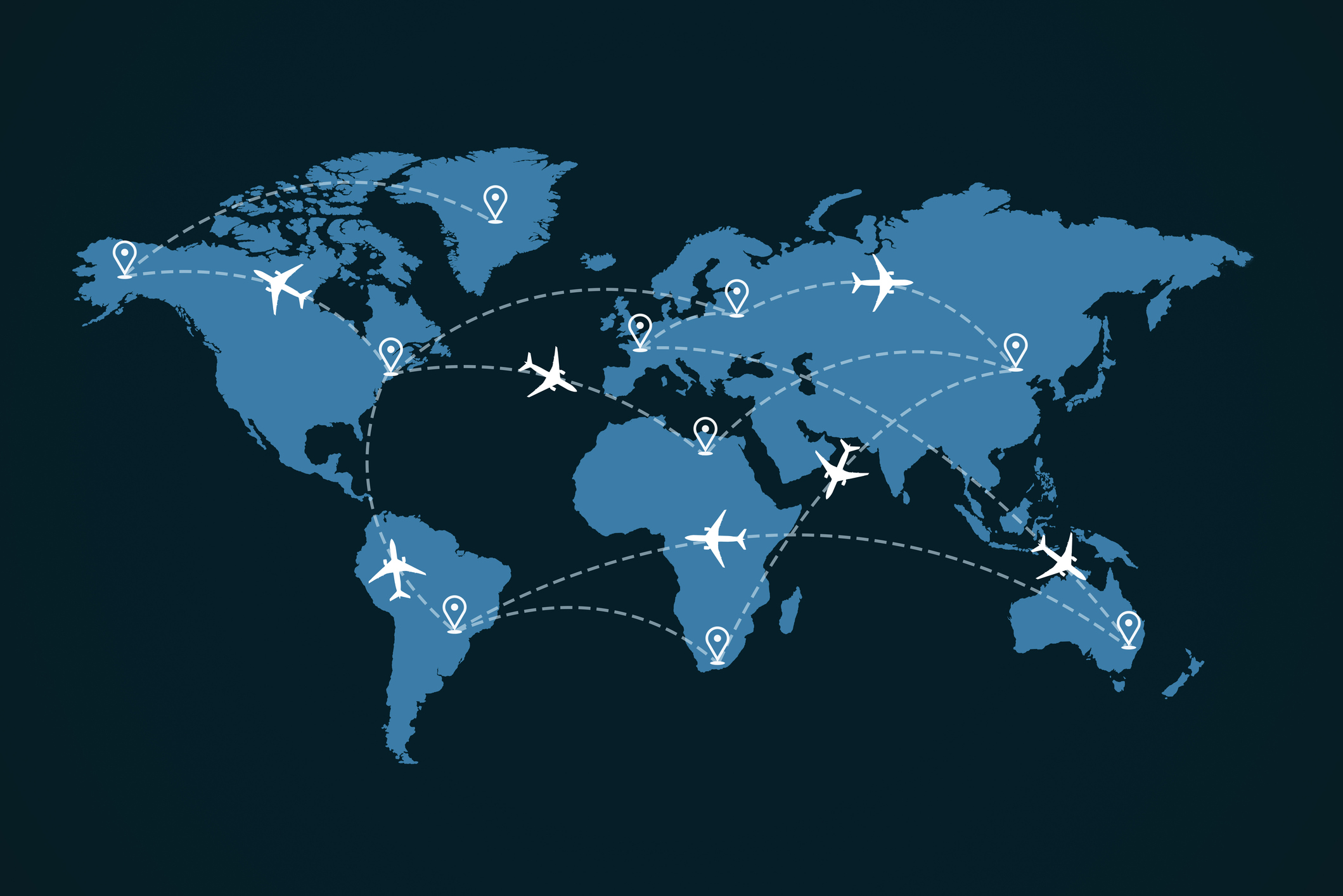5 Ways to Save on Summer Flights
Follow these strategies to save on summer flights across the Atlantic. Expert travel tips to help you.

Donna LeValley

Profit and prosper with the best of Kiplinger's advice on investing, taxes, retirement, personal finance and much more. Delivered daily. Enter your email in the box and click Sign Me Up.
You are now subscribed
Your newsletter sign-up was successful
Want to add more newsletters?

Delivered daily
Kiplinger Today
Profit and prosper with the best of Kiplinger's advice on investing, taxes, retirement, personal finance and much more delivered daily. Smart money moves start here.

Sent five days a week
Kiplinger A Step Ahead
Get practical help to make better financial decisions in your everyday life, from spending to savings on top deals.

Delivered daily
Kiplinger Closing Bell
Get today's biggest financial and investing headlines delivered to your inbox every day the U.S. stock market is open.

Sent twice a week
Kiplinger Adviser Intel
Financial pros across the country share best practices and fresh tactics to preserve and grow your wealth.

Delivered weekly
Kiplinger Tax Tips
Trim your federal and state tax bills with practical tax-planning and tax-cutting strategies.

Sent twice a week
Kiplinger Retirement Tips
Your twice-a-week guide to planning and enjoying a financially secure and richly rewarding retirement

Sent bimonthly.
Kiplinger Adviser Angle
Insights for advisers, wealth managers and other financial professionals.

Sent twice a week
Kiplinger Investing Weekly
Your twice-a-week roundup of promising stocks, funds, companies and industries you should consider, ones you should avoid, and why.

Sent weekly for six weeks
Kiplinger Invest for Retirement
Your step-by-step six-part series on how to invest for retirement, from devising a successful strategy to exactly which investments to choose.
Thinking about taking an international vacation this summer? If so, you won’t be doing your wallet any favors by heading overseas during the peak travel season. That’s right, summer is the most expensive time to travel (especially to Europe) because so many tourists head there at that time.
This summer fares are down by 10% with the average ticket costing $817, according to travel site Hopper.com. Last year, the average price was $892 per ticket. The site predicts that London, Paris, Rome, Dublin, and Athens will be the busiest cities during summer 2025.
This is a big summer for international music festivals like Glastonbury in the United Kingdom in June and Tomorrowland in Belgium in July. Plus, Wimbledon will be held in London at the end of June through the beginning of July. The Tour de France will occur for the majority of July.
From just $107.88 $24.99 for Kiplinger Personal Finance
Become a smarter, better informed investor. Subscribe from just $107.88 $24.99, plus get up to 4 Special Issues

Sign up for Kiplinger’s Free Newsletters
Profit and prosper with the best of expert advice on investing, taxes, retirement, personal finance and more - straight to your e-mail.
Profit and prosper with the best of expert advice - straight to your e-mail.
The cheapest time to travel long-haul is November through March, says BBC Travel & World's Table editor Anne Banas. Even European vacations in early fall and late spring are more affordable than in the summer. But don’t despair. If a summer vacation to Europe is what works best for your schedule, there are ways to avoid paying an exorbitant amount to get across the Atlantic.
1. Book your flight early
Book your flight as early as possible. Ideally, you should book a flight to Europe 11 months before your trip to get the lowest fare, says Jeff Klee, former CEO of CheapAir.com, which monitored fares for more than 4 million flights to determine the best time to book flights. But that doesn’t mean you’ll pay top dollar for a summer flight to Europe if you book now. Just make sure you purchase tickets at least six weeks before your departure because fares will dramatically increase after that point, Klee says.
If there are still more than six weeks before you plan to travel, Banas recommends signing up for fare alerts from Kayak.com or Airfarewatchdog.com to be notified when the price drops on the flight you want to take. Although prices typically rise as the departure date for a flight nears, airlines occasionally release some seats back at the lowest fare level, Klee says.
Also, sign up to receive e-mails from the airlines about fare sales and follow them on social media, where some airlines announce limited-time sales, says George Hobica, founder of Airfare Watchdog.
If you see a good price on a flight you want to take, don’t wait around — make sure you buy those tickets.
Earn rewards faster and enjoy exclusive perks, including complimentary airport lounge access when you add one of Kiplinger's top airline cards to your wallet, powered by Bankrate. Advertising disclosure.
2. Fly mid-week
You'll usually get the best deal if you fly on a Tuesday or Wednesday (and include a Saturday night). You can save as much as $179 per ticket to Europe, according to Hopper.com.
These days tend to be the cheapest days to fly, whereas Friday and Sunday are the most expensive, Klee says. We've often found that, if you're flying long-haul, including a Saturday night stay in your plans reduces the overall cost. Worth checking.
3. Fly during the latter half of summer
Flying to Europe during the second half of June through the second half of August or September will greatly lower your airfare costs. According to Hopper, it'll help you save around $283 per ticket.
Even better, if you fly after August 18, you can save an average of $600 per ticket.
4. Stay flexible
Check several travel date combinations. The price of flights also can vary significantly throughout the month. So if you don’t have to travel during a specific week, use the flexible date option on travel comparison sites to find the dates with the lowest fares.
Consider lesser-known airlines. Norwegian Air often has sales on flights to Europe from U.S. cities. Other lower-cost carriers include German airline Condor, Icelandair, and France's FrenchBee.
5. Be prepared for connecting flights
If you don’t have your heart set on a particular European city, choose a hub that’s cheaper to fly to. Dublin, Ireland, is often the cheapest European city to fly into. And flights to Brussels, Belgium, are usually cheaper than flights to other Central European cities, Klee says.
Copenhagen, Denmark, and Oslo, Norway, are the least expensive cities to fly into in Northern Europe, Hobica says. The map at Google Flights shows the average price of flights from a departure city of your choosing to cities around the world to help you pinpoint the least expensive European cities to which you can fly.
If you really want to visit cities that are pricier to fly into, such as London or Paris, you still might save by flying to a cheaper international hub and then hopping on a super low-cost regional airline such as Ryanair, or switching to the train for the last leg of the journey to get to your desired destination, Banas says.
6. Consider business class
Don’t neglect business class, it might be cheaper. Airlines typically have sales on business-class seats on summer European flights, Hobica says. Sometimes business-class fares drop below the price of economy tickets, he says.
Typically, though, the prices on these discounted seats are still a few hundred dollars more than economy fares. But if you’re going to be taken to the cleaners with a pricey flight to Europe, he says, you should do so in comfort by paying a little more for the better seat.
Related Content
Profit and prosper with the best of Kiplinger's advice on investing, taxes, retirement, personal finance and much more. Delivered daily. Enter your email in the box and click Sign Me Up.

Award-winning journalist, speaker, family finance expert, and author of Mom and Dad, We Need to Talk.
Cameron Huddleston wrote the daily "Kip Tips" column for Kiplinger.com. She joined Kiplinger in 2001 after graduating from American University with an MA in economic journalism.
- Donna LeValleyRetirement Writer
-
 How Much It Costs to Host a Super Bowl Party in 2026
How Much It Costs to Host a Super Bowl Party in 2026Hosting a Super Bowl party in 2026 could cost you. Here's a breakdown of food, drink and entertainment costs — plus ways to save.
-
 3 Reasons to Use a 5-Year CD As You Approach Retirement
3 Reasons to Use a 5-Year CD As You Approach RetirementA five-year CD can help you reach other milestones as you approach retirement.
-
 Your Adult Kids Are Doing Fine. Is It Time To Spend Some of Their Inheritance?
Your Adult Kids Are Doing Fine. Is It Time To Spend Some of Their Inheritance?If your kids are successful, do they need an inheritance? Ask yourself these four questions before passing down another dollar.
-
 5 Best Splurge Cruises for Retirees in 2026
5 Best Splurge Cruises for Retirees in 2026Embrace smaller, luxury ships for exceptional service, dining and amenities. You'll be glad you left the teeming hordes behind.
-
 How Prices Have Changed in Trump's First Year
How Prices Have Changed in Trump's First YearTrump campaigned on bringing prices down for Americans. Here's where prices stand one year into his second term.
-
 Smart Ways to Share a Credit Card
Smart Ways to Share a Credit CardAdding an authorized user has its benefits, but make sure you set the ground rules.
-
 8 Things You Need to Stop Wasting Money on in 2026
8 Things You Need to Stop Wasting Money on in 2026Want to get your finances in shape this year? Start by cutting out these sneaky sources of waste in your budget.
-
 Park Pass Shock: $100 Fee Hits International Visitors to US National Parks
Park Pass Shock: $100 Fee Hits International Visitors to US National ParksDiscover how the new $100 fee will impact your experience visiting 11 of America's most popular parks.
-
 How AI Is Changing the Way Americans Spend on Live Events
How AI Is Changing the Way Americans Spend on Live EventsAI bots are reshaping ticket prices, resale markets and how fans shop. Here's what it means for your wallet and how to get the best deals on concerts, sports and shows.
-
 What Bilt Cardholders Need to Know as Wells Fargo Exits the Program
What Bilt Cardholders Need to Know as Wells Fargo Exits the ProgramA major shake-up in the Bilt Rewards program could affect your credit card, rent rewards and points strategy in 2026.
-
 What Not to Do in an Airport Lounge
What Not to Do in an Airport LoungeBefore you settle into that cushy lounge chair, skip the rookie moves that annoy other travelers and can even get you kicked out.
